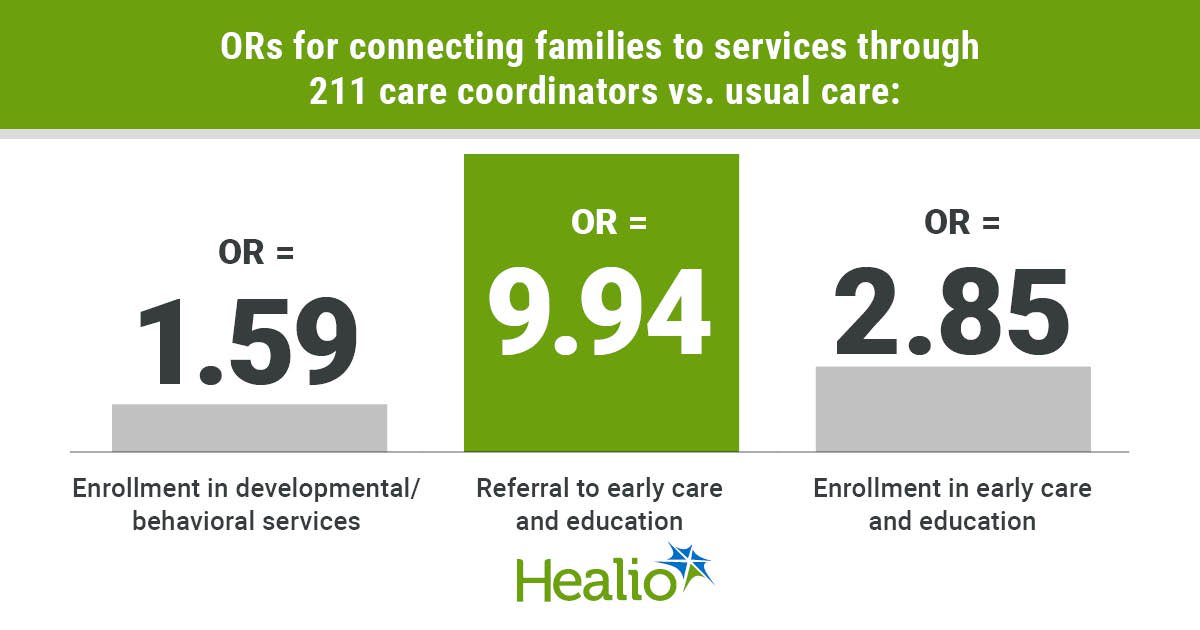November 14, 2025
3 min read
Key takeaways:
- Referring families to 211, a community resource hotline, increased the number who enrolled in services by 59%.
- Children who were referred to 211 care coordinators also enrolled in services sooner.
Referring families to the 211 community resource hotline nearly doubled the odds that toddlers would be enrolled in developmental and behavioral services, and it helped connect families to services faster, according to a study.
211 is a free hotline available nationwide that connects people with local resources to assist with food, housing, employment and health care — including developmental and behavioral services for children.

Data derived from Nelson BB, et al. Pediatrics. 2025;doi:10.1542/peds.2025-071644.
The AAP recommends developmental and behavioral health screening at well-child visits starting at age 6 months. However, screening is only the first part of the process, and there are many steps between screening and receiving services where families can get lost, according to Bergen B. Nelson, MD, MS, associate professor of pediatrics at Children’s Hospital of Richmond at Virginia Commonwealth University, and colleagues.
In a study of 152 families at one community health center, Nelson and colleagues found that partnering with a 211 care coordinator to screen toddlers for developmental concerns increased the odds that children would be referred to and enrolled in services, compared with screening at the health center.
“It can be hard for pediatricians and other pediatric primary care providers to do this on their own, since they may not have the time or the knowledge of all the resources out there for early childhood development,” Nelson told Healio. “Even a coordinator within a practice might not have the specialized knowledge of early childhood systems that these care coordination specialists with 211 did. It really takes a dedicated person with the time and expertise to connect families with the services they need.”
Their latest randomized controlled trial included 521 families with a child aged 12 to 42 months (mean age, 20 months) who had a well-child visit at one of four health systems in Los Angeles County, California, between January 2020 and October 2021. The researchers reported that 85% of families were Hispanic or Latino, 75% were publicly insured, and 49% of participating parents and caregivers had completed a high school degree or less.
Of these families, 260 were randomly assigned to be referred to a 211 Los Angeles care coordinator and 261 received usual care. The researchers previously published 6-month follow-up data in July 2024, and this study includes data for up to 2 years after enrollment.
In the 6-month follow up study, the researchers reported that children in the intervention group were more likely to be enrolled in at least one service, compared with the control group.
These findings persisted through the 2-year follow-up period, according to the authors. Compared with the control group, a larger proportion of children with moderate or high risk for developmental delay were referred to (62% vs. 68%) and enrolled in (37.5% vs. 54%) developmental and behavioral services. Of the children who were referred to services, compared with control, a larger proportion in the intervention group successfully enrolled (58.2% vs. 64.9% overall; 61% vs. 79.7% moderate/high risk), the researchers reported.
In their analysis, the researchers pointed out that the intervention did not significantly impact the odds that children would be referred to developmental and behavioral services, but it did increase the odds that they would enroll by 59% (OR = 1.59; 95% CI, 1.01-2.52). This effect was even more pronounced among children with moderate or high risk for developmental delay (OR = 1.89; 95% CI, 1.01-3.54). Using 211 also increased the odds that children would be referred to early care and education by almost 10-fold (OR = 9.94; 95% CI, 5.67-17.43) and the odds of enrollment by nearly three times (OR = 2.85; 95% CI, 1.93-4.22).
“We were pleased to see that this effectiveness was sustained for 2 years after families enrolled in the study,” Nelson said. “Not only were more children in the 211 care coordination intervention group connected to services than in the control group, but children who were connected were connected faster.”
The COVID-19 pandemic began during this study, which the researchers noted may have led to delays in connecting children to services. Thirteen families reported delaying or denying services because of concerns about COVID-19, according to the authors.
“It will be important to replicate in a post-pandemic environment without some of the delays and disruptions that families in our study may have experienced,” she said.
For more information:
Bergen B. Nelson, MD, MS, can be reached at bergen.nelson@vcuhealth.org.











